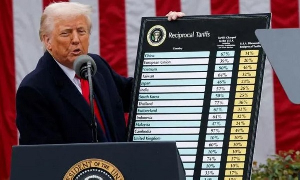The International Monetary Fund (IMF) says unless economic miracles happen, short-term vulnerabilities would put Ghana’s economy out of shape.
According to the Breton Woods Institutions, which the government is courting for a possible bailout, current vulnerabilities have put Ghana’s transformation agenda at risk.
It explained: “Short-term vulnerabilities have risen significantly, amid high fiscal and current account deficits.
“The international reserve position has weakened alongside mounting public debt. High interest rates, and a depreciating currency have begun to weaken private sector activity, and spreads on Ghana’s Eurobonds have risen above those of regional peers,” the latest IMF Staff Report has said. The report is based on their recent visit, and engagements with key managers of the Ghanaian economy in the country.
The IMF Staff Report is conducted as part of Article IV Consultation. The latest report is based on information available to the team at the time of discussions. The IMF mission team was led by Christina Daseking. Ghana’s report was completed in late April this year. Madam Daseking and her team noted with concern: “Economic growth is slowing from previously high levels.
Following estimated GDP growth of 5½ percent in 2013, Staff projects a further deceleration to 4¾ percent in 2014. Driven by the depreciation and administered price increases, inflation reached 13½ percent at end 2013 and 14½ percent in March. Monetary policy was tightened as the fiscal consolidation target was missed.
"Despite significant policy efforts, the 2013 fiscal (cash) deficit reached an estimated 10.9 percent of GDP, versus a target of 9 percent. In the absence of additional measures, the 2014 deficit is projected at 10¼ percent of GDP, with consolidation made more difficult by slower growth. To address rising inflation, the monetary policy rate was raised to 18 percent, and reserve requirements were tightened. Current vulnerabilities put Ghana’s transformation agenda at risk.
“The government’s objectives of economic diversification, shared growth and job creation, and macroeconomic stability rely on the reallocation of resources from current to capital spending. Yet, high twin deficits and large interest payments on rising public debt are crowding out priority expenditure and private sector activity,” she observed.
Madam Daseking recommended: “Macroeconomic stability will need to be restored to preserve a positive medium-term outlook. The financial sector is adequately capitalised and liquid, but increasing exposures will need to be monitored closely."
Stress tests conducted by the Bank of Ghana (BoG) suggest that buffers are adequate in most banks, and the system in aggregate. Nevertheless, the weaker macroeconomic outlook and currency depreciation expose the financial sector to credit and foreign exchange risks, warranting a strengthening of crisis prevention and management capabilities, according to the IMF.
According to the BoG, total assets of banks operating in Ghana have risen significantly. In the first two months (from January to February) of this year, the banking sector remained relatively stable, and continued to record growth in total assets, the Central Bank’s latest data revealed. Total assets as at the end of February 2014, went up to Ghc39.1 billion, from Ghc28 billion in February 2013. This was driven mainly by advances, which accounted for 47.1 per cent of the total, it added.
The Governor of the BoG, Dr. Henry Kofi Wampah, explained that the growth in assets was mainly funded by deposits, which recorded an annual growth of 29 percent to $10.5 billion (Ghc25.1 billion) at the end of February 2014. The growth of the banks’ assets fit in perfectly into the mantra of government officials, who insist that the short term prospects of the Ghanaian economy are brighter than before.
They based their argument on the 7.4% growth of the economy, as well as the flamboyant profits being made by banks operating in the country. But, renowned economist Dr. Mahamudu Bawumia disagreed with the assertion that because the banks were making profits, the economy was doing well.
“As you can see, many small and medium enterprises (SMEs) are dying because of the current economic challenges. So, it is wrong to say that all is well with the economy,” he added. Also, the banks recently complained that the intervention measures being implemented by the BoG to halt the rapid depreciation of the Ghanaian Cedi had worsened their plights.
A paper presented by the Executive Head of Business Development, Bank of Africa, Mr. William Boateng, on the impact of the central bank’s intervention measures, revealed a slump in revenue of the local banks, largely because of a reduction in trade business between them. According to Mr. Boateng, because of the restrictions in cash withdrawals over the counter from the Foreign Exchange Account (FEA) or Foreign Currency Account (FCA), most customers nowadays prefer doing business outside the bank.
“The US$10,000 rate is quite not attractive to customers; aside that, traders will build their money with the local account, but when it comes to the transfers, they withdraw everything. Nobody knows who is doing the transfers for them. This is affecting our revenues,” argued Mr. Boateng in a paper presented at a policy forum organised by the Institute of Economic Affairs (IEA).
The local banks, The Chronicle learnt, also lose a lot of revenue after pre-financing the export of goods and services for their clientele, without any benefit when their clientele refuse to collect and repatriate in full the proceeds of their exports to their local banks within 60 days of shipment, as required by the Central Bank.
“A lot of the exports in the country, most of the times, are pre-financed. When they do the export, the proceeds don’t come to the country. This is impacting negatively on our revenue,” noted Mr. Boateng. It would be recalled that the mission from IMF visited Accra from February 12 to 25, 2014 to hold discussions for the 2014 Article IV Consultation.
The IMF Mission to Ghana delegation met Vice-President Kwesi Amissah-Arthur, Minister of Finance Seth Terkper, Governor, Bank of Ghana (BoG) Dr. Kofi Wampah and other senior officials, Members of Parliament (MPs), representatives of the private sector, think-tanks and civil society.
On its return to Washington D.C., US, the team prepared the staff report that has been tentatively discussed by the Executive Board in late April, this year. The Board discussion completed the Article IV Consultation.
General News of Tuesday, 3 June 2014
Source: The Chronicle













